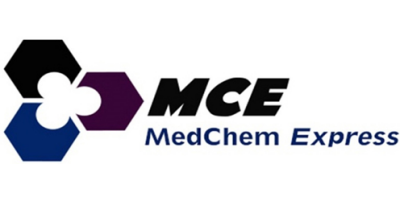

- Home
- Companies
- MedChemExpress LLC (MCE)
- Products
- MedChemExpress - Model ...
MedChemExpress - Model Dehydrocorydaline chloride - 10605-03-5
Dehydrocorydaline chloride (13-Methylpalmatine chloride) is an alkaloid that regulates protein expression of Bax, Bcl-2; activates caspase-7, caspase-8, and inactivates PARP[1]. Dehydrocorydaline chloride elevates p38 MAPK activation. Anti-inflammatory and anti-cancer activities[2]. Dehydrocorydaline chloride shows strong anti-malarial effects (IC50 =38 nM), and low cytotoxicity (cell viability > 90%) using P. falciparum 3D7 strain[3].MCE products for research use only. We do not sell to patients.
Dehydrocorydaline chloride
MCE China:Dehydrocorydaline chloride
Brand:MedChemExpress (MCE)
Cat. No.HY-N0674A
CAS:10605-03-5
Synonyms:13-Methylpalmatine chloride
Purity:99.23%
Storage:4°C, sealed storage, away from moisture *In solvent : -80°C, 6 months; -20°C, 1 month (sealed storage, away from moisture)
Shipping:Room temperature in continental US; may vary elsewhere.
Description:Dehydrocorydaline chloride (13-Methylpalmatine chloride) is an alkaloid that regulates protein expression of Bax, Bcl-2; activates caspase-7, caspase-8, and inactivates PARP. Dehydrocorydaline chloride elevates p38 MAPK activation. Anti-inflammatory and anti-cancer activities. Dehydrocorydaline chloride shows strong anti-malarial effects (IC50 =38 nM), and low cytotoxicity (cell viability > 90%) using P. falciparum 3D7 strain.
In Vitro:Treatment of C2C12 myoblasts with 500 nM Dehydrocorydaline increases the expression levels of muscle-specific proteins, including MyoD, myogenin and myosin heavy chain. Treatment with Dehydrocorydaline elevates p38 MAPK activation and the interaction of MyoD with an E protein. Furthermore, defects in differentiation-induced p38 MAPK activation and myoblast differentiation induced by depletion of the promyogenic receptor protein Cdo in C2C12 myoblasts are restored by Dehydrocorydaline treatment[2]. Dehydrocorydaline significantly inhibits MCF-7 cell proliferation in a dose- dependent manner, which can be reversed by a caspase-8 inhibitor, Z-IETD-FMK. Dehydrocorydaline increases DNA fragments without affecting ΔΨm. Western blotting assay shows that dehydrocorydaline dose-dependently increases Bax protein expression and decreases Bcl-2 protein expression. Furthermore, dehydrocorydaline induces activation of caspase-7,-8 and the cleavage of PARP without affecting caspase-9. These results show that dehydrocorydaline inhibits MCF-7 cell proliferation by inducing apoptosis mediated by regulating Bax/Bcl-2, activating caspases as well as cleaving PARP[1].
In Vivo:Dehydrocorydaline (3.6, 6 or 10 mg/kg, i.p.) shows a dose-dependent antinociceptive effect in the acetic acid-induced writhing test and significantly attenuates the formalin-induced pain responses in mice. In the formalin test, dehydrocorydaline decreases the expression of caspase 6 (CASP6), TNF-α, IL-1β and IL-6 proteins in the spinal cord. These findings confirm that Dehydrocorydaline has antinociceptive effects in mice[4].
Animal Administration:Briefly, the mice are placed individually in glass beakers and are allowed to acclimate for 30 min before the test. The vehicle or Dehydrocorydaline (3.6, 6 or 10 mg/kg) are injected (10 ml/kg, i.p.) 15 min prior to the formalin injection. Morphine (10 mg/kg) or diclofenac sodium (20 mg/kg) are injected 15 and 30 min, respectively, prior to the formalin injection as positive controls. Then, 25 μL of a 5% formalin solution is injected into the plantar surface of the right hind paw of each mouse. Immediately after the formalin injection, the mice are placed individually in the beakers, and a mirror is placed under the beaker to allow clear observation of the paws of the animals. The time that the animals spent on biting/licking the injected paw is measured with a stopwatch every 5 min and considered as indication of nociception.
Cell Assay:Briefly, MCF-7 cells (1×104 cells/well) are seeded in 96-well plates and treated with different concentrations of dehydrocorydaline (0-200 μM) for 24 h. The cell viability is determined. To explore the role of caspase-8 in dehydrocorydaline induced cytotoxicity, a caspase-8 inhibitor Z-IETD-FMK (10 μM) is co-incubated with 200 μM dehydrocorydaline.
IC50 & Target:Plasmodium
Hot selling product:Calcein | Gliotoxin | Epcoritamab | [6]-Gingerol | Reveromycin A | (R)-3-Hydroxybutanoic acid | Inosine | SB-269970 (hydrochloride) | Glutathione oxidized | KL206
Trending products:Recombinant Proteins | Bioactive Screening Libraries | Natural Products | Fluorescent Dye | PROTAC | Isotope-Labeled Compounds | Oligonucleotides
References:
[1]. Xu Z, et al. Dehydrocorydaline inhibits breast cancer cells proliferation by inducing apoptosis in MCF-7 cells. Am J Chin Med. 2012;40(1):177-85. [Content Brief]
[2]. Yoo M, et al. Dehydrocorydaline promotes myogenic differentiation via p38 MAPK activation. Mol Med Rep. 2016 Oct;14(4):3029-36. [Content Brief]
[3]. Nonaka M, et al. Screening of a library of traditional Chinese medicines to identify anti-malarial compounds and extracts. Malar J. 2018 Jun 25;17(1):244. [Content Brief]
[4]. Yin ZY, et al. Antinociceptive effects of dehydrocorydaline in mouse models of inflammatory pain involve the opioid receptor and inflammatory cytokines. Sci Rep. 2016 Jun 7;6:27129 [Content Brief]
Brand introduction:
• MCE (MedChemExpress) has a global exclusive compound library of more than 200 kinds, and we are committed to providing the most comprehensive range of high-quality small molecule active compounds for scientific research customers around the world;
• More than 50,000 highly selective inhibitors and agonists are involved in various popular signaling pathways and disease areas;
• The products cover a variety of recombinant proteins, peptides, commonly used kits, more PROTAC, ADC and other characteristic products, widely used in new drug research and development, life science and other scientific research projects;
• Provide virtual screening, ion channel screening, metabolomics analysis detection analysis, drug screening and other professional technical services;
• It has a professional experimental center and strict quality control and verification system;
• Provide LC/MS, NMR, HPLC, chiral analysis, elemental analysis and other quality inspection reports to ensure the high purity and high quality of products;
• The biological activity of the products has been verified by the experiments of customers in various countries;
• A variety of top journals such as Nature, Cell, Science and pharmaceutical patents have included the scientific research results of MCE customers;
• Our professional team tracks the latest pharmaceutical and life science research and provides you with the latest active compounds in the world;
• It has established long-term cooperation with the world's major pharmaceutical companies and well-known scientific research institutions。
